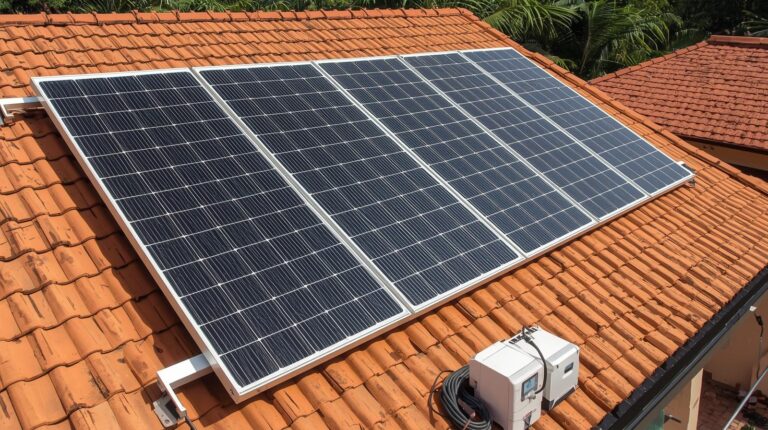Are you ready to unlock the full power of the sun?
Well, buckle up because we’re about to take you on a wild ride through the world of solar energy.
In this article, we’re diving deep into the key factors that affect solar panel efficiency and how to determine the perfect number of panels for your home.
But that’s not all!
We’ll also be exploring energy conservation, maintenance tips, and the future of solar power.
So sit back, relax, and let’s harness the sun’s energy like never before!
Factors Affecting Solar Panel Efficiency
Weather significantly impacts the efficiency of solar panels. Maximizing solar panel lifespan and optimizing solar panel placement are crucial for optimal energy production.
When it comes to weather, sunny days are the best for solar energy production. However, cloudy days can reduce the peak efficiency of solar panels. So, it’s essential to consider the number of sunny days in your region when planning for solar power.
Additionally, the placement of solar panels plays a vital role in their efficiency. South-facing roofs are ideal, but east and west-facing roofs also generate high power. Proper planning and placement will ensure long-term investment in solar energy.
Determining Solar Panels Based on House Size
When determining the number of solar panels needed for a home, factors such as house size and energy usage breakdown play a crucial role in the decision-making process.
As we embark on the solar panel installation process, it’s important to consider the potential challenges that may arise.
Larger homes typically require more energy, which means they’ll need a higher number of solar panels to meet their electricity needs.
On the other hand, smaller homes tend to consume less energy and, therefore, require fewer panels.
To determine the optimal number of panels, it’s essential to quantify the energy requirements, assess available roof or ground space, conduct an energy audit, and select the best solar technology.
Energy Consumption and Conservation
How can we effectively reduce energy consumption and conserve energy in our households? Here are some energy conservation techniques that can help us in our quest to reduce our carbon footprint:
- Unplug unnecessary devices: Did you know that even when your appliances are turned off, they still consume energy? Unplugging devices that aren’t in use can save you a surprising amount of energy and money.
- Use energy-efficient lighting: Switching to LED bulbs can significantly reduce your energy consumption. Plus, they last longer, so you won’t have to climb up that ladder to change them as often.
- Insulate, insulate, insulate: Proper insulation can prevent heat loss in the winter and keep your home cool in the summer. It’s like giving your house a cozy sweater, but without the questionable fashion choices.
Determining the Optimal Number of Solar Panels
To determine the optimal number of solar panels for your home, we can consult with a qualified solar technology professional. They’ll consider various factors, such as your energy requirements, available roof or ground space, and the specific solar technology that suits your needs. The energy requirements can be quantified in Kilowatt-Hours (kWh) from your utility bills.
Ideally, south-facing roofs are perfect, but east and west-facing roofs can also generate high power. It’s crucial to plan properly for a long-term investment in solar energy.
Integrating solar power with smart home technology can further maximize solar power in urban environments. By using smart devices, you can monitor and control your energy consumption more efficiently. Additionally, energy conservation techniques, such as sealing leaks and improving insulation, can reduce the number of solar panels needed.
Maintenance of Solar Panels
Now let’s delve into the maintenance of solar panels to ensure optimal performance and longevity. Here are some key techniques to keep your solar panels clean and extend their lifespan:
- Regular Cleaning Techniques:
- Use a soft brush or sponge to remove dust and debris.
- Avoid abrasive materials that could scratch the surface.
- Use a mild detergent mixed with water for stubborn dirt.
- Rinse thoroughly with clean water to avoid residue buildup.
- Inspecting for Damage or Wear:
- Check for cracks or loose connections regularly.
- Look for signs of wear on the frame or glass.
- Replace any damaged components promptly.
- Monitoring Energy Production and Consumption:
- Keep track of your panel’s energy output.
- Compare it with your energy consumption to identify any discrepancies.
Maximizing Solar Power in Different Weather Conditions
In different weather conditions, maximizing solar power is essential for optimal energy production. One of the key factors is the impact of shading on solar panel efficiency. Shading from buildings, trees, or other objects can significantly reduce the amount of sunlight reaching the panels, thus decreasing their performance. It’s crucial to strategically place solar panels in areas with minimal shading to maximize their power output.
Additionally, different weather conditions such as cloudy days can also affect solar panel efficiency. While solar panels can still generate electricity on cloudy days, their peak efficiency may be reduced. Therefore, it’s important to consider local weather patterns and design solar systems accordingly.
Benefits of Solar Power for the Environment
By strategically maximizing solar power in urban areas, we can contribute to the environmental benefits of solar energy.
Solar power offers several advantages that positively impact the environment:
- Reduced greenhouse gas emissions: Solar power generates electricity without the release of harmful greenhouse gases, helping to combat climate change.
- Conservation of natural resources: Solar energy is a renewable resource that harnesses the power of the sun, reducing our reliance on finite fossil fuels.
- Improved air quality: Solar power reduces the need for burning fossil fuels, resulting in cleaner air and a healthier environment.
These benefits not only contribute to a greener planet but also create a more sustainable future for generations to come.
Financial Incentives and Return on Investment for Solar Power
To maximize the benefits of solar power, it’s important to explore the financial incentives and return on investment available for this renewable energy source.
Solar power not only reduces electricity bills but also offers financial incentives that make it a wise investment. One such incentive is the Federal Investment Tax Credit (ITC), which allows homeowners to deduct a percentage of the cost of installing a solar system from their federal taxes. Additionally, many states offer rebates and incentives for solar installations, further reducing the upfront costs.
To determine the return on investment for solar power, a cost analysis should be conducted. This analysis takes into account factors such as the cost of installation, maintenance, and the savings in electricity bills over the lifespan of the solar system.
Integrating Solar Power With Other Renewable Energy Sources
We can enhance the efficiency and sustainability of our energy systems by incorporating solar power with other renewable energy sources. This integration allows us to maximize our energy production and minimize our reliance on non-renewable resources.
Here are three ways in which we can integrate solar power with other renewable energy sources:
- Integrating solar power with wind energy:
- Wind turbines can be installed alongside solar panels to harness the power of both the sun and wind simultaneously.
- Solar panels can help offset the intermittency of wind energy by providing a consistent source of electricity during times of low wind.
- Combining solar and wind energy systems can provide a more stable and reliable power supply.
- Integrating solar power with hydroelectric power:
- Solar panels can be installed near hydroelectric dams to generate additional power during daylight hours.
- The excess electricity generated by solar panels can be used to pump water back into the dam, increasing its potential energy for later use.
- This integration can help optimize the use of both solar and hydroelectric power, maximizing their combined benefits.
Future Developments and Innovations in Solar Power Technology
In the realm of solar power technology, our focus now shifts to future developments and innovations that hold the potential to further optimize energy production and sustainability.
The future advancements in solar power technology are aimed at improving the efficiency of solar panels, allowing for greater energy generation and utilization. Researchers are exploring new materials, such as perovskite, that have the potential to significantly increase the efficiency of solar cells. Additionally, advancements in nanotechnology are being explored to enhance the absorption and conversion of sunlight into electricity.
Other areas of research include the development of innovative solar tracking systems and the integration of energy storage technologies to maximize the use of solar power even during non-optimal conditions.
These efficiency improvements in solar power technology won’t only contribute to a more sustainable future but also bring us closer to achieving a renewable energy revolution.
With a touch of humor.
Conclusion
By understanding the factors that affect solar panel efficiency and determining the optimal number of panels for your home, you can maximize the power of solar energy.
Energy conservation practices and regular maintenance are crucial for long-term investment in solar power.
Harnessing the full potential of solar power not only benefits the environment but also offers financial incentives and the opportunity to integrate with other renewable energy sources.
Stay ahead of future developments and innovations in solar technology to continue optimizing your energy usage.




